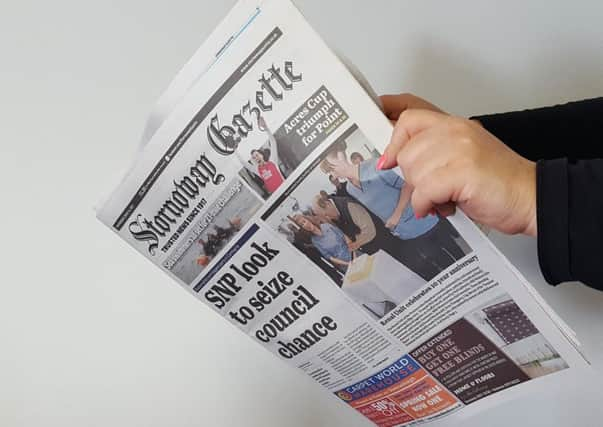Trusted local papers never fake it


It is alleged that the US election result was influenced by a widespread belief in fake news among Trump supporters.
A poll found that 73 per cent of Trump voters thought the billionaire financier George Soros paid protesters to disrupt the Republican candidate’s rallies – a fake news report later repeated by the president-elect himself.
Advertisement
Hide AdAdvertisement
Hide AdNow, however, Trump is accusing broadcasters and newspapers of spreading fake news.
So what exactly is fake news and how is it being spread so effectively?
There can be little doubt that social media has helped bring fake news into the lives of everyone with a computer or smartphone.
It takes many forms. At its most extreme and destructive, it comprises statements which are cynically distributed in the guise of real news with the aim of deceiving for political or financial gain.
Advertisement
Hide AdAdvertisement
Hide AdMore frequently, it is an unsubstantiated rumour indiscriminately posted on social media sites which rapidly gains credence, to the distress of those featured in it and, often, the alarm of those who read it.
Repetition through ‘shares’ and ‘likes’ adds an undeserved authority to these fake news stories.
So this Local Newspaper Week, May 15 to May 21, seems an apt time to shine the spotlight on the trust you deservedly place in this newspaper.
It also gives us a chance to celebrate our trusted role at the heart of communities.
Advertisement
Hide AdAdvertisement
Hide AdUnlike social media and the major digital platforms, this newspaper and its website are accountable for every word published.
We have signed up to a comprehensive Editors’ Code of Practice – which even our detractors have imitated – and our staff have contractually bound themselves to its requirements.
It encompasses everything – from accuracy to privacy, harassment to intrusion into grief, protecting children to reporting crime, as well as the use of clandestine devices and subterfuge.
The code is also explicit in the sensitivity we show in reporting suicides and protecting the most vulnerable in our society.
Advertisement
Hide AdAdvertisement
Hide AdVirtually all the content we generate is produced by journalists trained by the National Council for the Training of Journalists to the highest industry benchmarks.
These reporters are qualified in a range of skills – from newspaper law to shorthand– to ensure we report the facts correctly.
Every word our reporters writes is checked in our offices by qualified staff.
And if we do make a genuine mistake, you can contact us immediately.
Advertisement
Hide AdAdvertisement
Hide AdWe are real people, who are just a call away – not some digital algorithm!
Johnston Press Scotland editorial director Colin Hume said: “Many of our local newspapers in Scotland have been in existence for a century or more.
“They have often been the single catalyst for social change. At heart, they are the conscience of a community and the defender of its truth.
“With pride, we provide trusted news and honest advertisement platforms.
Advertisement
Hide AdAdvertisement
Hide Ad“And thanks to the tireless diligence of our editorial staff you can be confident that our stories are always exactly what they purport to be – the genuine article. Fact, not fake.
“We are honest brokers of local information, upholding the values that you share with us.
“And when you buy our local weekly newspapers or advertise with us you are supporting the very journalism and quality that keeps integrity at the heart of all we do.”
Sir Martin Sorrell, CEO of public relations firm WPP, has issued a warning to Google and Facebook that they need to get their act together to address brand safety and fake news online.
Advertisement
Hide AdAdvertisement
Hide AdHe said that the dominance of these two companies had led to clients seeking alternative ways to reach audiences.
Global tech platforms have failed to protect brands from appearing alongside hugely damaging content.
So it’s little surprise that major businesses are increasingly shunning digital sites which have placed their advertisements alongside offensive material.
That scenario would never happen in our print or digital pages.
Advertisement
Hide AdAdvertisement
Hide AdWhen you share your stories or advertise with us, you are sharing in the family values that underpin everything we do.
We are uniquely placed to ensure that our newspapers and websites enhance and magnify your values.
In the run up to Local Newspaper Week, local papers came together to make this point through the pan-industry Fighting Fake News campaign.
Prime Minister Theresa May is one of several high-profile figures to stress the importance of trusted local journalism in combating fake news.
High levels of trust and reader engagement are key assets of our papers. And it is clear they are needed now more than ever before.